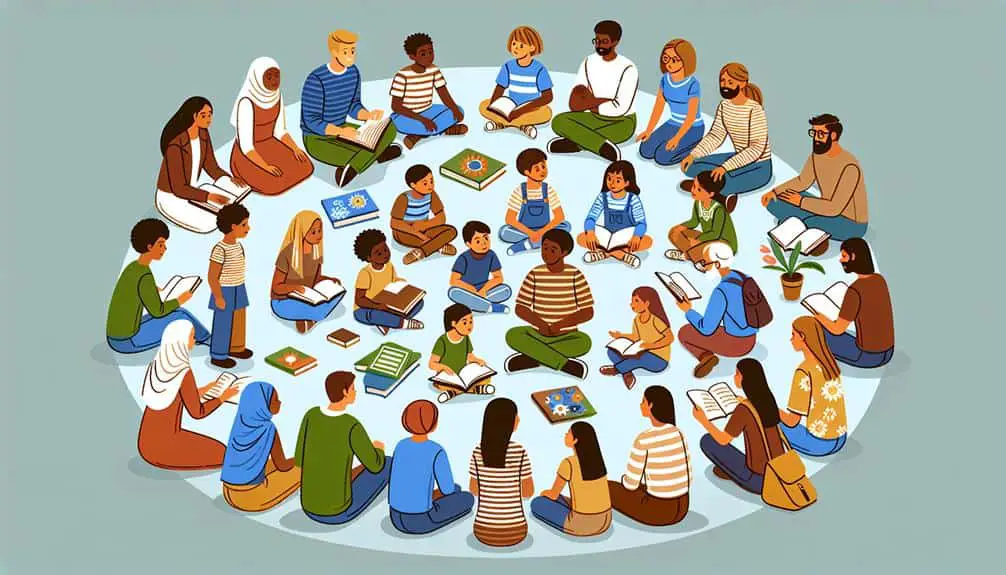In homeschooling leadership, socialization is crucial for developing essential interpersonal skills and effective leadership abilities. Peer interactions and group dynamics shape leadership skills, offering valuable practice grounds. Engaging with diverse backgrounds cultivates adaptability and problem-solving capacities. Home-based socialization challenges are addressed through proactive strategies and community involvement. Participation in group projects, community activities, and leadership workshops enhances leadership competencies. Homeschooling dynamics uniquely provide socialization benefits, fostering confidence and open-mindedness. Understanding the role of socialization in homeschooling leadership is key to honing leadership potential.
Key Points
- Socialization shapes interpersonal skills and leadership abilities.
- Homeschooling offers unique opportunities for leadership development through social interactions.
- Group activities and community programs enhance essential leadership skills.
- Participation in discussions and projects builds confidence in leadership roles.
- Exposure to diverse perspectives fosters adaptability and open-mindedness.
Socialization Concerns in Homeschooling
When considering homeschooling, addressing socialization concerns is important to grasp its impact on students' development.
Socialization worries often center around the concern that homeschooled children may lack opportunities to interact with peers, potentially hindering their social skills. However, research indicates that homeschooled students have ample chances for socialization through community activities, sports, and homeschooling co-ops.
Parent involvement plays a significant role in alleviating socialization fears, as engaged parents can actively seek out social opportunities for their children. Studies show that parental involvement positively influences children's social development, fostering strong communication skills and the ability to form meaningful relationships.
Impact of Socialization on Leadership Skills
Research demonstrates a strong correlation between socialization experiences and the development of leadership skills in homeschooled students. Peer interactions and group dynamics play vital roles in shaping leadership abilities. When homeschooled students engage with peers in various settings, such as community groups or extracurricular activities, they have the opportunity to practice essential leadership skills. Through group projects or team sports, students learn to communicate effectively, collaborate with others, and take on leadership roles. These experiences provide homeschooled students with a platform to hone their decision-making abilities, conflict resolution skills, and emotional intelligence.
Moreover, exploring diverse social situations allows homeschooled students to understand different perspectives, enhance their problem-solving capabilities, and adapt to various leadership styles. By interacting with peers from diverse backgrounds, homeschooled students can broaden their leadership competencies and cultivate a well-rounded approach to guiding others. Overall, socialization experiences significantly contribute to the development of leadership skills in homeschooled students by offering them valuable opportunities to practice, learn, and grow in a supportive social environment.
Addressing Socialization Challenges in Homeschooling
Addressing socialization challenges in homeschooling requires proactive strategies to guarantee well-rounded development in students. One common challenge is the stereotype that homeschooled children lack social skills due to limited interaction. However, research shows that homeschooled students often participate in various social activities such as community volunteering, sports teams, and interest-based clubs, challenging this misconception. By actively engaging in these opportunities, homeschoolers can build connections with peers who share similar interests, fostering meaningful relationships and social growth.
To address socialization challenges effectively, parents can organize regular social gatherings or join homeschooling co-ops where students can interact with their peers. These platforms provide a supportive environment for children to develop communication skills, teamwork, and empathy. Additionally, leveraging technology for virtual socialization can help bridge the gap for isolated homeschoolers, offering opportunities for online group projects, discussions, and virtual field trips.
Enhancing Socialization for Leadership Development
To cultivate leadership skills in homeschooled students, fostering an environment that encourages socialization is paramount. Enhancing socialization for leadership development can be achieved through various techniques and activities tailored to promote the necessary skills.
Here are three effective ways to enhance socialization for leadership development:
- Group Projects: Encouraging group projects among homeschooling students fosters collaboration, communication, and teamwork. These projects can range from academic assignments to extracurricular activities, providing opportunities for students to interact, negotiate, and lead within a group setting.
- Community Involvement: Involving homeschooled students in community service or local events exposes them to diverse social situations, enhances their empathy and problem-solving skills, and allows them to engage with individuals from different backgrounds, thereby broadening their perspective.
- Leadership Workshops: Organizing leadership workshops or seminars specifically designed for homeschooled students can offer valuable insights into leadership principles, styles, and strategies. These workshops provide a platform for students to practice decision-making, communication, and other essential leadership skills in a controlled environment, enabling them to grow and develop their abilities.
Importance of Socialization in Homeschool Leadership
The socialization process in homeschool leadership plays an essential role in shaping students' interpersonal skills and overall leadership capabilities. Homeschooling dynamics present unique opportunities for socialization benefits that contribute greatly to leadership development through social interaction.
In a homeschool setting, students often engage in various group activities, co-op classes, and community programs, allowing them to interact with diverse peers and adults. These interactions foster the development of essential leadership skills such as communication, teamwork, empathy, and conflict resolution.
Participating in group discussions, collaborative projects, and extracurricular activities within homeschooling communities provides students with a platform to practice leadership roles, decision-making, and problem-solving in real-life situations. These experiences not only enhance their social skills but also build confidence in their ability to lead effectively.
Additionally, exposure to different perspectives and ideas during socialization in homeschooling leadership cultivates open-mindedness and adaptability, important traits for successful leaders in today's dynamic world. Consequently, socialization in homeschooling plays a pivotal role in nurturing well-rounded individuals with strong leadership potential.




